Safeguarding the Health of Taiwan's Foreign Workers
By Huang Shen Ying-fang (黃沈瑛芳)
Photos by Chen Li Shao-min (陳李少民)
Zhang Chang-e (張嫦娥)
Hsiao Yiu-hwa (蕭耀華)
Abridged and translated by Shawn Chang (張牧軒)
Syharn Shen (沈思含)
Safeguarding the Health of Taiwan's Foreign Workers
By Huang Shen Ying-fang (黃沈瑛芳)
Photos by
Chen Li Shao-min (陳李少民)
Zhang Chang-e (張嫦娥)
Hsiao Yiu-hwa (蕭耀華)
Abridged and translated by
Shawn Chang (張牧軒)
Syharn Shen (沈思含)
On a Sunday, on the checkerboard floor of the hall at Taipei Main Station, foreign workers sit together in groups. Some chat cheerfully, some play the guitar while singing pop songs of their home country, and some light up candles on a cake to celebrate their friend's birthday. The languages they speak and the bright-colored traditional costumes they wear attract curious eyes from passing travelers.
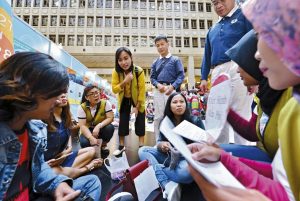
At the hall of Taipei Main Station, foreign workers wearing Tzu Chi's volunteer vests invite their fellow countrymen to visit the free clinic held nearby.
"Tzu Chi is holding a free clinic over there. You are all welcome to come get a health check!" A group of foreign-looking people wearing Tzu Chi's volunteer vests walk to each group of migrant workers and sincerely invite them in Indonesian and English.
At the west side of the main hall, there is an open space that looks like a small hospital. As foreign workers arrive, they are greeted and welcomed to register and have their height, weight, blood pressure, etc measured. This is a free clinic for foreign workers at Taipei Main Station. Held once every two months, it is organized by members of Tzu Chi International Medical Association (TIMA). Around 1:00 p.m., migrant workers come to the free clinic for registration, and after a regular check-up, they can go to the departments they want to visit.
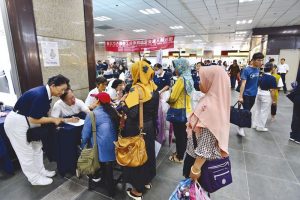
Foreign workers wait in line for consultations while Tzu Chi volunteers and nurses give detailed explanations.
Having served as an in-home caregiver in Taiwan for seven years, Yuli has come to the free clinics many times already. "This service is really convenient for us," she said. She added that foreign workers don't have regular vacations, and when they are sick, their employers are usually too busy to take them to the doctor. It's also inconvenient for the workers themselves to seek medical care. So, whenever Tzu Chi holds a free clinic at Taipei Main Station on Yuli's day off, she'll come to get her eyes and teeth checked. "We left our homeland to come work in Taiwan. It's very heartwarming to know that there are people who really care for us. The doctors and the volunteers at the free clinics are very friendly," Yuli said with a strong Indonesian accent.
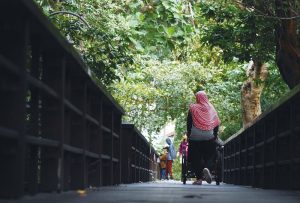
In parks and public spaces, foreign workers are often seen pushing seniors in wheelchairs. Caring for the elderly day and night, the health and wellbeing of the foreign workers also need to be taken care of.
Besides receiving medical service herself, Yuli also serves as a volunteer interpreter at the free clinics to help fellow workers from Indonesia. Most of them have come to Taiwan to care for the elderly. As the seniors they serve often wake up in the middle of the night, these caregivers also have to get up and care for them, so they often lack enough sleep and feel very tired. When Yuli feels unwell, she can only pat and rub different parts of her body. "At times like this, I'd especially miss home…," she said with yearning in her voice.
For another native of Indonesia, Falar, it is her second time in Taiwan as a foreign worker. Waiting to be transferred to her next employer, Falar wants to earn money and send it back home to her kids so they can have better lives. She has visited many departments in Tzu Chi's free clinics before, and her skin condition improved with the medicine the doctors gave her. With her stomach often upset, Falar said that the doctor found out quickly that she ate nothing in the mornings and only drank coffee, so the doctor suggested her to change her diet. "Now I feel better. For me, internal medicine services have been most helpful," she said.
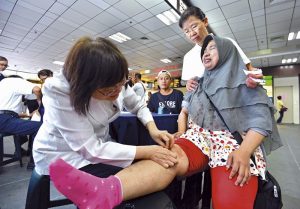
Foreign workers are not familiar with acupuncture, but when it relieves their symptoms and discomfort, they are willing to receive treatment again.
Falar explained that in Indonesia, a visit to the hospital is expensive, so minor sicknesses are often left untreated. Here in Taiwan, due to limitations at work, seeing a doctor is often not possible either. "It's really nice to be able to see a doctor. I feel good afterwards," she said in Mandarin, not fluent but understandable.
Falar also said that when foreign workers have free time, most hospitals and clinics are closed, so the free clinics held on Sundays are especially helpful to them. She is very thankful that so many doctors, nurses, and volunteers in Taiwan use their free time during weekends to provide medical services to them. "I'm really grateful that Tzu Chi offers this service for us on our days off."
In 2018, Taiwan has more than 700,000 foreign workers, which means that one out of every 34 people in Taiwan is a foreign worker. Among this significant labor force, over 200,000 work as institutional caretakers or in-house caregivers, and they are indispensable in the sector of Taiwan's long-term care.
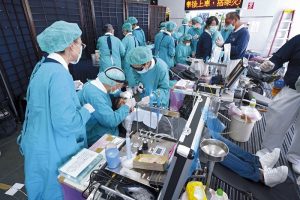
The well-equipped dental department is the busiest of all departments in the free clinic.
Since 2004, TIMA began to hold free clinics for foreign workers in places where they often gather, such as the 228 Peace Memorial Park and St. Christopher's Church in Taipei. Since 2005, with the help from the Taipei City Government and the National Health Insurance Administration, Tzu Chi began to hold regular free clinics once every two months at Taipei Main Station.
In addition to serving migrant workers regularly in Taipei City, TIMA also holds free clinics in other cities and counties in Taiwan. In New Taipei City for example, TIMA works with the local government to provide free clinics four times a year on events that celebrate important festivals in Indonesia, Thailand, Vietnam, and the Philippines. In the seaports of Pingdong and Kaohsiung in southern Taiwan, TIMA also offers free clinics and health education to foreign workers working as fishermen there.
Tzu Chi's free clinics provide comprehensive medical service complete with a registration area, a section for regular checkups, and departments in dentistry, ophthalmology, orthopedics, traditional Chinese medicine, and family medicine. By trying their best to provide quality service, Tzu Chi's medical volunteers safeguard the health and wellbeing of Taiwan's foreign workers with love.
Quick Facts on Foreign Workers in Taiwan
(Source: Ministry of Labor) |
Contact Us | Plan a Visit | Donate
8 Lide Road, Beitou 11259, Taipei, Taiwan
886-2-2898-9999
005741@daaitv.com
©Tzu Chi Culture and Communication Foundation
All rights reserved.
